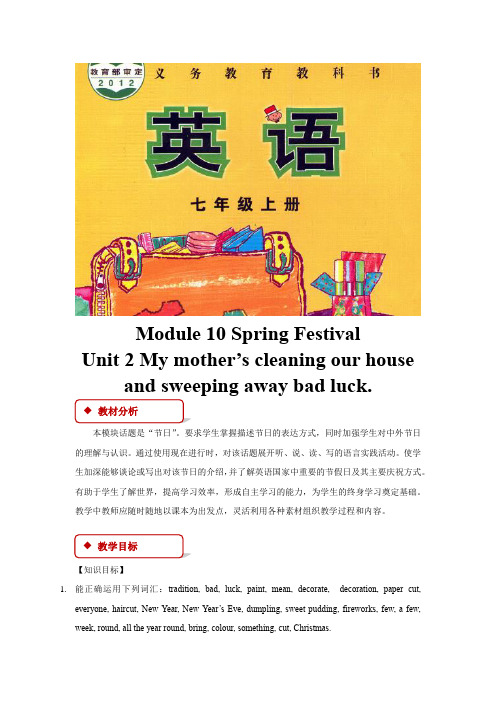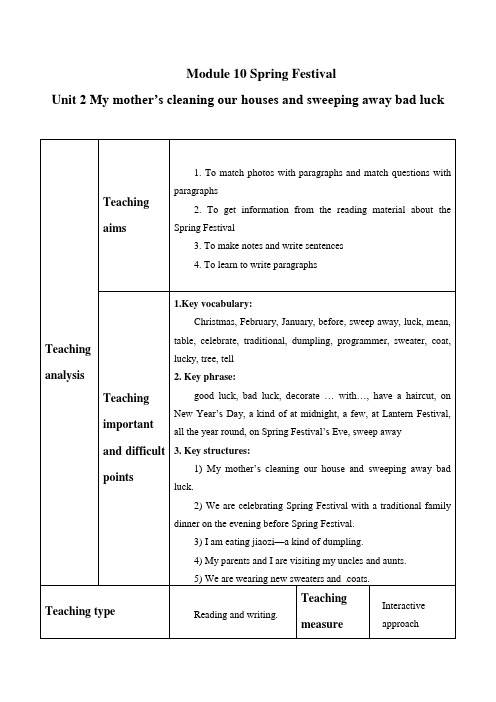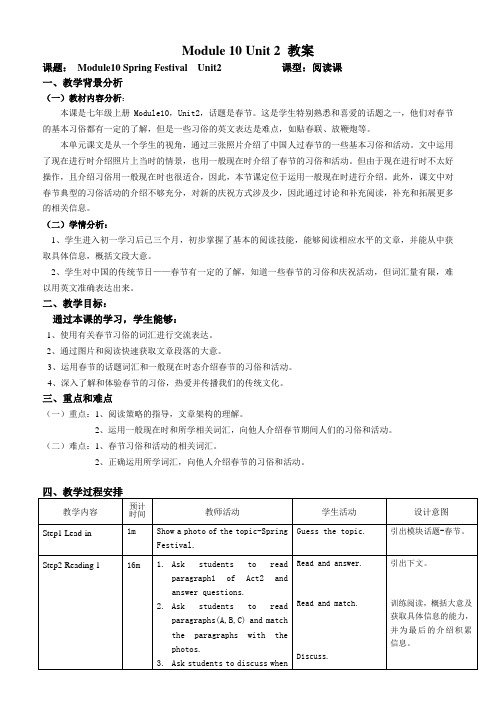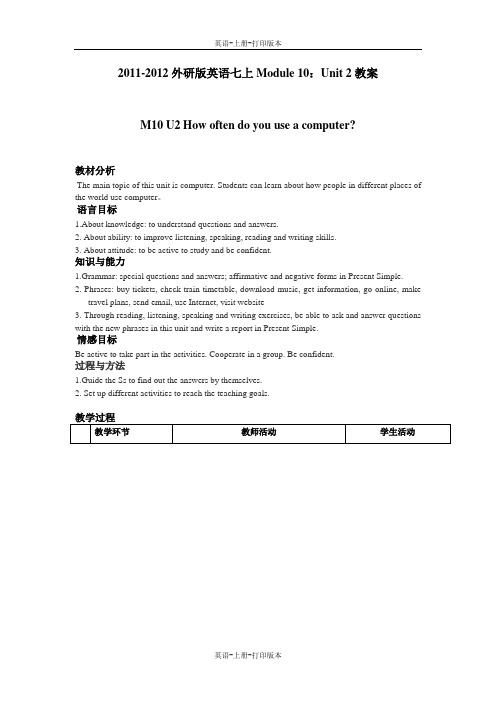外研版英语七年级上Module10 Unit2 教学设计
- 格式:doc
- 大小:840.50 KB
- 文档页数:8

Module 10 Spring Festival Unit 2 My mother’s cleaning our house and sweeping away bad luck.本模块话题是“节日”。
要求学生掌握描述节日的表达方式,同时加强学生对中外节日的理解与认识。
通过使用现在进行时,对该话题展开听、说、读、写的语言实践活动。
使学生加深能够谈论或写出对该节日的介绍,并了解英语国家中重要的节假日及其主要庆祝方式。
有助于学生了解世界,提高学习效率,形成自主学习的能力,为学生的终身学习奠定基础。
教学中教师应随时随地以课本为出发点,灵活利用各种素材组织教学过程和内容。
【知识目标】1.能正确运用下列词汇:tradition, bad, luck, paint, mean, decorate, decoration, paper cut,everyone, haircut, New Year, New Year’s Eve, dumpling, sweet pudding, fireworks, few, a few,week, round, all the year round, bring, colour, something, cut, Christmas.2. 能读懂对正在发生的事情的描述;3. 能描述正在发生的事情。
【能力目标】1. 正在发生的事情的描述;2. 学会写明信片;3. 学会描述自己或他人正在做的事情;4. 学会用and 连接句子。
【情感目标】通过对其他国家或地方人们生活的了解,培养对异国文化、生活习俗的兴趣,提高对本国文化的认识。
【教学重点】能够通过阅读材料读懂描述春节的短文,并能与每一段落相对应的图片搭配,熟练运用现在进行时。
【教学难点】区分现在进行时与一般现在时的用法,用所学的知识描述英国的圣诞节。
Tape recorder, MultimediaStep 1. Warming-up1.Talk about what you know about the Spring Festival.2.Talk about the questions:What traditions do you know? (food and decorations)Do you know the paper cut?Do you often have a haircut?Step 2. Vocabulary1. Show some pictures, ask the students to look at the pictures, then talk something about thepictures.3. Introduce the new words and expression and transform verb phrases into the gerunds.4. Read the new words and expressions.5. Look at the pictures and talk about what’s happening.Step 3. Listening and reading1.Listen to the text and answer the questions below.1. When does the Spring Festival usually come?2. What should mother do before Spring Festival?3. How are the people celebrating on the Spring Festival evening?2. Complete the passage with the correct words and expression from the box.celebrate dumplings few luck meanprogramme sweep away traditionalStep 4. Language points1.with prep. 和,带有,用2. It’s a few days before Spring Festival.a few一些,表示肯定的概念,修饰可数名词复数。

Module 10 Spring FestivalUnit 2 My mother’s cleaning our houses and sweeping away bad luckTeaching analysis Teachingaims1. To match photos with paragraphs and match questions withparagraphs2. To get information from the reading material about theSpring Festival3. To make notes and write sentences4. To learn to write paragraphsTeachingimportantand difficultpoints1.Key vocabulary:Christmas, February, January, before, sweep away, luck, mean, table, celebrate, traditional, dumpling, programmer, sweater, coat,lucky, tree, tell2. Key phrase:good luck, bad luck, decorate … with…, have a haircut, on New Year’s Day, a kind of at midnight, a few, at Lantern Festival,all the year round, on Spring Festival’s Eve, sweep away3. Key structures:1) My mother’s cleaning our house and sweeping away badluck.2) We are celebrating Spring Festival with a traditional familydinner on the evening before Spring Festival.3) I am eating jiaozi—a kind of dumpling.4) My parents and I are visiting my uncles and aunts.5) We are wearing new sweaters and coats.Teaching type Reading and writing.Teachingmeasure Interactive approachTeaching tools Recorder, OHP, videoTeaching proceduresChapter 1 Lead-in : Warming upStep 1 Warming-up1. Review the text of Unit 1.2. Show some pictures, ask the students to look at the pictures, then talk something about the pictures.3. Introduce the new words.4. Read the new words.Chapter 2 The students can learn by themselves, and ask some questions about the study.Step 2 Work in pairs.1. Read through the example sentences in Activity 1.—What’s Li Shan’s mother doing?—She’s cleaning the house.2. Look at the pictures and talk about what’s happening.Step 3 Group work1. Listen to the passage and answer the questions.1) Who is cleaning the house?2) Who gives Li Shan a Hongbao?Keys: Li Shan’s mother is cleaning the house.Li S han’s uncles and aunts.2. Read the passage and match the paragraphs with the pictures in Activity 1.3. Check with a partner.4. Call back the answers from the whole class.Keys: 1 2 3Chapter 3 The students can learn the main point with the help of the teacher, and solve the problems.Step 4 Reading.1. Play the recording.2. Ask the students to read through the passage.Read the passage and complete the sentences.1) People usually _____ houses and sweep away ___________ before Spring Festival.2) After the traditional family dinner, people usually watch a ________ on TV.3) In China, hongbao means _______ money.Keys: 1. clean; bad; luck 2. special programme 3. lucky3. Complete the passage with the correct words and expression from the box in Activity 3.celebrate dumpling few luck mean programme sweep away traditionalWe (1) ________ Spring Festival in January or February. A (2) ___ days before Spring Festival we clean our homes and (3) ___________ all the bad (4) ____.In the evening before Spring Festival we have a big family dinner. We eat lots of (5) _________ food, such as jiaozi –a kind of (6) _________. We usually watch a special (7) __________ on television, and parents usually give their children a hongbao. It (8) ______ lucky money.4. Check with a partner.5. Call back the answers from the whole class.Keys:1celebrate 2.few 3.sweep away 4.luck 5traditional6dumplings 7.programme 8. MeansRead the passage together.Step 5 Writing and speaking.1. Look at the notes about Christmas in Britain.The notes about Christmas in Britain.a) go shopping for presentsb) have a traditional family dinnerKeys:sweep it away sweep away the paper/ sweep the paper away2. We are celebrating Spring Festival with a traditional family dinner on the evening before Spring Festival.celebrate作动词,意为“庆祝”。

Module 10 Spring FestivalUnit 2 My mother’s cleaning our house and sweeping away bad luck.单词 Christmas, February, January, before,1. To match photos with paragraphs and match questions with paragraphs2. To make notes and write sentences3. To learn to write paragraphsTo get information from the reading material about the Spring FestivalStep 1 Warming-up1. Review the text of Unit 1.2. Show some pictures, ask the students to look at the pictures, then talk something about the pictures.3. Introduce the new words.4. Read the new words.Step 2 Work in pairs.1. Read through the example sentences in Activity 1.—What’s Li Shan’s mother doing?—She’s cleaning the house.2. Look at the pictures and talk about what’s happening.Step 3 Group work1. Listen to the passage and answer the questions.2. Read the passage and match the paragraphs with the pictures in Activity 1. Step 4 Reading.1. Play the recording.2. Ask the students to read through the passage.Read the passage and complete the sentences.3. Complete the passage with the correct words and expression from the box in Activity 3.4. Check with a partner.5. Call back the answers from the whole class.6. Read the passage together.Step 5 Language points1. My mother’s cleaning our house and sweeping away bad luck.sweep away是动词短语,意为“扫去”。

Module 10 Unit 2 教案课题:Module10 Spring Festival Unit2 课型:阅读课一、教学背景分析(一)教材内容分析:本课是七年级上册Module10,Unit2,话题是春节。
这是学生特别熟悉和喜爱的话题之一,他们对春节的基本习俗都有一定的了解,但是一些习俗的英文表达是难点,如贴春联、放鞭炮等。
本单元课文是从一个学生的视角,通过三张照片介绍了中国人过春节的一些基本习俗和活动。
文中运用了现在进行时介绍照片上当时的情景,也用一般现在时介绍了春节的习俗和活动。
但由于现在进行时不太好操作,且介绍习俗用一般现在时也很适合,因此,本节课定位于运用一般现在时进行介绍。
此外,课文中对春节典型的习俗活动的介绍不够充分,对新的庆祝方式涉及少,因此通过讨论和补充阅读,补充和拓展更多的相关信息。
(二)学情分析:1、学生进入初一学习后已三个月,初步掌握了基本的阅读技能,能够阅读相应水平的文章,并能从中获取具体信息,概括文段大意。
2、学生对中国的传统节日——春节有一定的了解,知道一些春节的习俗和庆祝活动,但词汇量有限,难以用英文准确表达出来。
二、教学目标:通过本课的学习,学生能够:1、使用有关春节习俗的词汇进行交流表达。
2、通过图片和阅读快速获取文章段落的大意。
3、运用春节的话题词汇和一般现在时态介绍春节的习俗和活动。
4、深入了解和体验春节的习俗,热爱并传播我们的传统文化。
三、重点和难点(一)重点:1、阅读策略的指导,文章架构的理解。
2、运用一般现在时和所学相关词汇,向他人介绍春节期间人们的习俗和活动。
(二)难点:1、春节习俗和活动的相关词汇。
2、正确运用所学词汇,向他人介绍春节的习俗和活动。
五、板书设计。

2011-2012外研版英语七上Module 10:Unit 2教案M10 U2 How often do you use a computer?教材分析The main topic of this unit is computer. Students can learn about how people in different places of the world use computer。
语言目标1.About knowledge: to understand questions and answers.2. About ability: to improve listening, speaking, reading and writing skills.3. About attitude: to be active to study and be confident.知识与能力1.Grammar: special questions and answers; affirmative and negative forms in Present Simple.2. Phrases: buy tickets, check train timetable, download music, get information, go online, maketravel plans, send email, use Internet, visit website3. Through reading, listening, speaking and writing exercises, be able to ask and answer questions with the new phrases in this unit and write a report in Present Simple.情感目标Be active to take part in the activities. Cooperate in a group. Be confident.过程与方法1.Guide the Ss to find out the answers by themselves.2. Set up different activities to reach the teaching goals.课堂检测题:一. 根据中文写出英文单词。

Module 10AustraliaUnit 2 The game that they like most is Australia football.课型:读写课I.学习目标:1. 会用本课所学四会单词和短语2. 阅读理解短文,能用所学词汇,句型进行情景口头表达和书面表达。
Before-classRead words in class.Daily report.While-class一.交流检查课前预习情况:二.自主学习:1. Read fast and answer(A2)2.Read carefully and answer(A4,5).3. Listen and repeat in a low voice with the tape..4.Read aloud alone.5.Read and fill in the blanks:(1)Tony is w______ a letter to his parents.(2.) We took a h______ tour over the rock.(3.) The colours of the rock are f______ , they change from purple to red.(4.)These stories d______ the spirits that created the world.(5.) The Australians have many British r______.(6.) Their family life is s______ to ours, and they enjoy the same food and hobbies.(7.) The outback is more like a desert, f______ of rocks and sand.(8.) The next day we a______ at Uluru, we went on a camel r______.(9.) The camel that I rode had a bad t______.(10.) It’s been a f_______ trip.6.Retell or recite the text.三.交流展示:Discuss language difficulties in groups to help each other .四.训练巩固:(一)根据中英文提示完成句子。
G7M10U2 How often do you use a computer?教材分析The main topic of this unit is computer. Students can learn about how people in different places of the world use computer。
语言目标1.About knowledge: to understand questions and answers.2. About ability: to improve listening, speaking, reading and writing skills.3. About attitude: to be active to study and be confident.知识与能力1.Grammar: special questions and answers; affirmative and negative forms in Present Simple.2. Phrases: buy tickets, check train timetable, download music, get information,go online, make travel plans, send email, use Internet, visit website3. Through reading, listening, speaking and writing exercises, be able to ask and answer questions with the new phrases in this unit and write a report in Present Simple.情感目标Be active to take part in the activities. Cooperate in a group. Be confident. 过程与方法1.Guide the Ss to find out the answers by themselves.2. Set up different activities to reach the teaching goals.课堂检测题:一. 根据中文写出英文单词。
Module 10 Unit 2Teaching content: Unit 2: My mother’s cleaning our houseTeaching aims:①Knowledge aim: enable students to master the phrases and words: In February; in January; sweep away; celebrate, clean the house; a traditional family dinner.②Ability aim: enable students to understand and talk about the celebration of Spring Festival.③Emotion aim: enable students to get to know and inherit our traditional culture.Teaching key and difficult points: To make students master the reading skills; enable students to talk about Spring Festival.Teaching and learning methods: task-based reading; PWP approachingTeaching aids/ preparation: PPT works.Teaching procedures:Step I: Pre-reading (Warming up )Revision:Work in pairs.look at the pictures and talk about what’shappening.(Activity 1, page 62)Available phrases: clean the house; have family dinner; visit relatives.Sentence structure: —What’s sb.Doing?—He / She /Sb.is doing sth.Step II:While-reading1.Fast readingStudents read the passage for the first time quickly and find out the answers tothe following questions:When does the Spring Festival come?What does “lucky money” mean?Before the group work, teacher guides to explain the structure of this passage (Writing skill——time order)①Match the paragraphs with pictures in Activity 1.3.Presentation and explanation of the language points.Students listen and read the passage, try to understand and translate it by themselves; at the same time, they are asked to underline sentences or phrases they can’t understand.After that, thee teacher explains language points in this passage.Step III: Post-readingSummary: teacher and students work together to retell the passage according to the key wors.(Table in detailed reading):a few days before Spring Festival→ on the eveningbefore Spring Festival→ during the Spring Festival.1.Teacher: the Spring Festival is a Chinese traditional festival, and it’s the mostimportant festival, we should keep its excellent traditions and inherit them. Homework: talk about your Spring Festival and write an article about it.(You can imitate the text)。